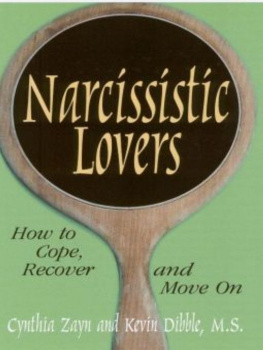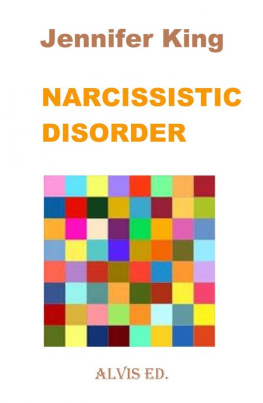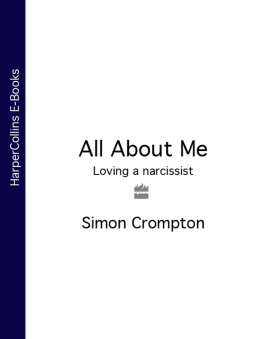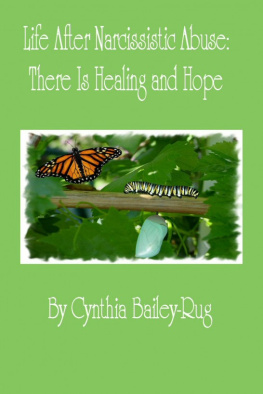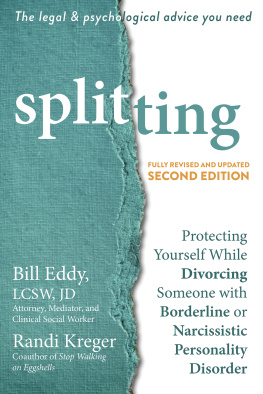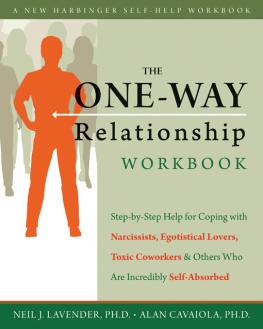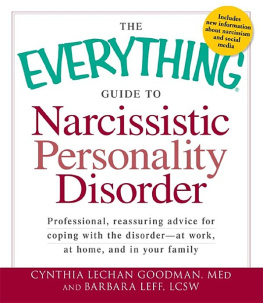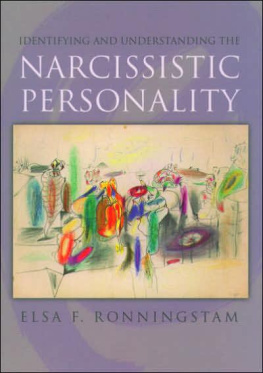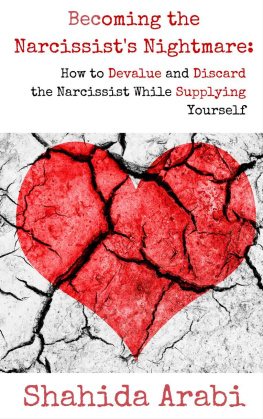Table of Contents
Acknowledgements
We would like to thank God for the opportunity to share our thoughts and sincere hopes with people who are going through difficulties in their relationships. Thanks to our families for their patience and understanding as we inundated them with information about NPD and spent time away from them as we worked on this project. We would also like to acknowledge Sam Vaknin as a major influence. His book, Malignant Self Love: Narcissism Revisited, offers profound insight from the perspective of a narcissist. Last but not least, our sincere thanks to the folks at Its a Grind coffee shop in Canton, Georgia for providing the necessary fuel and residence as we worked on final touches of this book.
Introduction
The beginning of a toxic relationship can sometimes appear so alluring and promising. The destructive features of the relationship are at first elusive, and seem indefinable. Many people blame themselves in an attempt to resolve the conflict, or may question the reality of their perceptions. In many cases, by the time the poison of the relationship is finally detected, emotional damage has already been done, and all that remains is the pain, self-doubt and confusion.
It can be hard work to recover from such a relationship without feeling permanently injured and disconnected from ones true self. An even greater challenge is to emerge from such a painful experience with increased clarity, personal power and hope. To achieve this level of healing and to move past mere survival first requires, very simply, a clear picture of what happened, and the major underlying causes.
Many victims of injurious and emotionally abusive relationships were unwittingly victimized by someone with Narcissistic Personality Disorder, an often misunderstood psychiatric condition that is characterized by, among other things, deceit, manipulation and complete and utter self absorption. If you feel you may have been involved with someone with Narcissistic Personality Disorder and you are struggling to find an explanation for what happened to you, know that this very motivation can be the source of your healing. For if you search and discover the true nature of a Narcissistic relationship the understanding and clarity you can achieve will be truly liberating.
Many readers would benefit from going through therapy as they seek to recover and redefine their lives. This can be a very difficult process to face alone, and an objective therapist can help sort out and identify forces such as family dynamics, childhood experiences, and intimacy issues that influence ones perceptions, feelings and choices. Further, many victims of Narcissists have endured emotional and/or physical abuse, making the impact of the relationship even more damaging, and the need for therapy more certain. This book is not meant to be a substitute for therapy, and the authors are not mental health professionals.
Since this book was written for victims of Narcissists, an academic writing style is avoided. The goal is to lead the reader on a personal journey that is more than a summary of psychological theory, for true healing of any type requires more of the reader than intellectualizing the experience. A personal tone is emphasized not only to enhance the books readability, but to create a writer/reader connection that is based on a sincere hope for personal growth and healing.
Many who have been hurt in a relationship that turned toxic without warning may have heard the terms Narcissist, or Narcissistic, but may not know that they were in a relationship with a Narcissist. Confusing the issue, the terms Narcissist, Narcissistic and Narcissism have been used to describe a wide variety of personality characteristics ranging from the phrase, a healthy Narcissism to full-blown Narcissistic Personality Disorder. In fact, it has been suggested by Alice Miller in The Drama of the Gifted Child that the term Narcissism has been so commonly used to describe such diverse meanings, that it is difficult today to rescue it for scientific use. Nevertheless, this book attempts to describe, in laymens terms, the complex forces at work that doom nearly all relationships with a Narcissist. In the process, a variety of terms are used that are not the authors own, such as the False Self (Winnicott), or Narcissized, (describing the experience of being victimized by a Narcissist), or supply (a Narcissists fuel for existence). These terms are found in scholarly journals, books, or even internet discussion sites, and are commonly used to describe the condition or dynamics of Narcissism.
Though no one truly knows the ratio of male Narcissists to female Narcissists, it is generally agreed to be somewhat more prevalent with males. Nevertheless, there is no shortage of Narcissists who are women, so throughout this book, gender pronouns will be used interchangeably to reflect this fact.
Part One
Chapter 1
Are You Involved With a Narcissist?
Hello Friend,
Still feeling confused about that crazy relationship? Are things still not adding up? Let me see if I have it straight. You say things appeared to be great when you first met him or her, almost too good to be true, right? It was uncanny how much you and your partner seemed to have in common. As a matter-of-fact, you felt you never had as much in common with any other person. Am I right?
In the beginning, he or she made you feel so appreciated. That special person complimented you by saying things like, You are the perfect fit, I have never had a relationship this special, I cannot believe how much we share and You are the best at... One reason these statements made you feel so significant was that your new interest told you stories of his or her previous partner who had been negative and demeaning. You were probably feeling sorry for your partner who had such an unhealthy relationship prior to you.
Not too long into the relationship, however, Im sure your lover began to make you feel insecure. Ohyou probably didnt quite notice it at first. Perhaps there were subtle put-downs or comparisons where you werent the one coming out on top anymore. Let me guess, some of the very things he or she used to praise you for became the things he used against you. This was confusing to you. How could you be the perfect fit, the best relationship he had ever had, his idea of a fairy tale romance, yet end up being the target of so many negative comments?
Did you ever start to wonder if you were going crazy? Did things in your relationship sometimes make absolutely no sense whatsoever? Did your partner deny saying things that you knew for a fact he/she had said? Did he/she ever accuse you of being the one telling the lie or misconstruing his/her words? If you answered yes to a few of these questions, it is very possible you were dating, or are still dating, a narcissist (an N).
In this book, we will use the letter N to indicate the Narcissist. Sometimes, we will use the male and sometimes the female pronoun to indicate the Narcissist. Narcissists can be of either gender. Although the latest DSM study shows there to be a shift to a greater percentage of females affected by NPD, seventy-five percent of narcissists are men.
Sigmund Freud was one of the first mental health professionals to describe narcissism in pathological terms. But only in 1980 did the Diagnostic and Statistics Manual (DSM), the standard classification of mental health professionals in the United States, recognize it as a mental health category. The DSM gives diagnostic criteria and the symptoms, which have to be present so that an accurate diagnosis can be made. Over time, the psychiatric community saw Narcissistic Personality Disorder (NPD) as a disorder that could be treated but not cured. According to recent studies, the causes of NPD are not known. However, it is believed to have its origins in the early childhood years and to have been influenced by parents, peers or caregivers of those afflicted. During a particular stage of personality development, either too much or not enough attention is given to a child who then learns to love himself or depend only on himself as a means of self-preservation.

